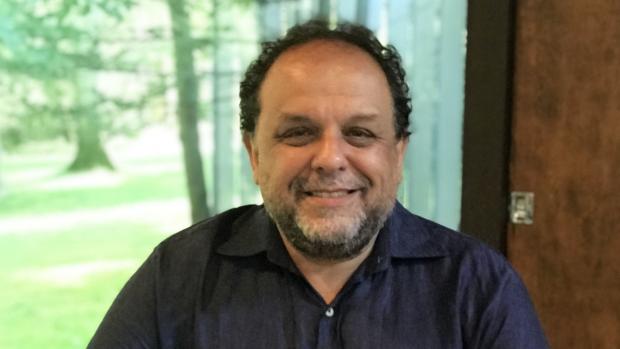A smarter look at traffic congestion
NYU Tandon’s C2SMART secures $15 Million center with funding from U.S. Department of Transportation

Professor Kaan Ozbay
NYU Tandon School of Engineering will continue its multi-faceted research and educational program to understand and combat traffic congestion, thanks to a five-year commitment of $2 million in annual federal funds recently awarded by the United States Department of Transportation (USDOT).
The money, along with $5 million in non-federal matching funds, creates the Connected Communities for Smart Mobility Toward Accessible and Resilient Transportation for Equitably Reducing Congestion (C2SMARTER) Center, selected by the USDOT as the only Tier 1 University Transportation Center (UTC) designated under the Bipartisan Infrastructure Law (BIL) to address the USDOT priority area of Reducing Congestion.
C2SMARTER continues the work of C2SMART, which was founded at NYU Tandon by its Director, Professor Kaan Ozbay, as a Tier 1 UTC in 2016 under the FAST Act. UTCs are USDOT-funded consortia of colleges and universities that advance state-of-the-art transportation research and technology. C2SMART uses New York City and its other consortium cities as living laboratories, seeking to develop and deploy congestion-reducing interventions adaptable to local communities.
The latest USDOT designation will fuel the current C2SMART Center’s ambitious research, education, training, and technology transfer vision of Professor Ozbay. The work will involve emerging technologies such as artificial intelligence, machine learning and connected and autonomous vehicles that will be tested and deployed using a variety of “cyber-physical testbeds” that are already operational or in planning stages.
“With this new funding, the C2SMARTER team will continue vital collaborations with our partner City and State DOTs on important infrastructure projects like that with the Brooklyn-Queens Expressway Triple Cantilever,” said Professor Ozbay. “We are thrilled by the opportunity to deliver on the strategic priorities of USDOT. Front and center is the commitment we share to create a more just and equitable transportation system that benefits everyone, but in particular those who have not been well served historically.”
By integrating transportation infrastructure, motorized and non-motorized travelers from diverse backgrounds, emerging services and modes, and interrelated urban networks such as energy grids and 5G (and 6G) communication networks, C2SMARTER’s research will direct attention towards how real-world solutions will interact with social, economic, and infrastructural inequities most often experienced by underserved communities.
“Transportation congestion problems in New York City and around the country have ripple effects into all our lives -- from unwieldy commutes to slower emergency response times -- and those effects are felt most acutely by people who live in areas underserved by infrastructure and other services,” said NYU Tandon School of Engineering Dean Jelena Kovacevic. “C2SMART’s work to address those challenges head on is a prime example of Tandon delivering on its mission to find technological solutions to our most pressing civic problems, including the urgent need for a more sustainable transportation network nationally.”
In the coming years, C2SMARTER will also expand its efforts to involve diverse students in transportation-related education initiatives. These include launching:
- a brand-new initiative designed to introduce key concepts in transportation through a fun, engaging curriculum for K-12 students.
- a Bridge Program for non-STEM undergraduates to interest them in the transportation field.
- an initiative for junior and senior high school education and outreach for community-embedded technologies for Rural, Isolated, Tribal, and Indigenous (RITI) communities.
Its commitment to extend technology transfer through its relationships with government agencies and other organizations means C2SMARTER will, among many related activities:
- broaden C2SMARTER's Network of Living Labs into a national portfolio of community deployments as support tools to engage with communities, in particular disadvantaged communities, to help them grapple with issues from the effects ranging from extreme weather events, to pollution due to congestion, to the community-level impacts of new modes and investments.
- collect data to track health impacts of congested roadways on neighboring communities with outreach to identify residents’ concerns .
- host workshops to study the impact of highway removal not only on congestion in dense urban environments, but also the community impacts of these changes.
The new C2SMARTER consortium, led by NYU Tandon, includes C2SMART's original members, Rutgers University, University of Washington, and University of Texas-El Paso, as well as new members: CUNY’s New York City College of Technology, Texas Southern University, and North Carolina A&T State University. This adds two Historically Black College and Universities (HBCUs), and brings the number of minority-serving institutions in the Center to four, showing the Center’s strong commitment to improving mobility of underserved communities especially in heavily congested urban areas.
The NYU Tandon transportation team led by Professor Ozbay is also a member of the Center for Social and Economic Mobility for People and Communities through Transportation, a Region 2 UTC led by City College of New York that received a commitment of $3 million in federal funding per year for five years from USDOT, under the BIL.




